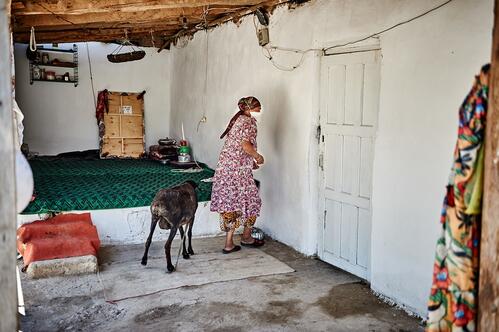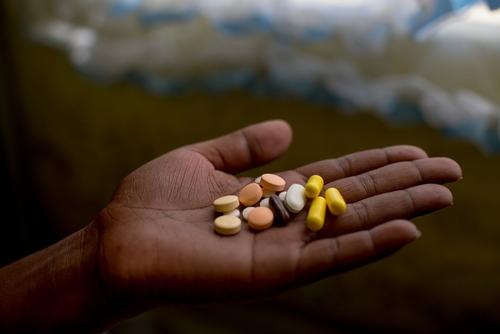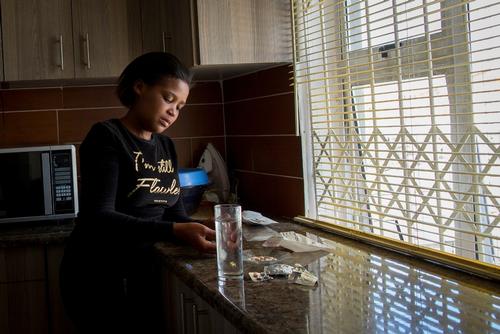Urgent phase-out needed for outdated policies of mandatory hospitalisation, re-treatment regimens that contribute to drug resistance, and sub-optimal diagnosis.
Geneva/Cape Town – Médecins Sans Frontières (MSF) and the Stop TB Partnership today released the second edition of the Out of Step report, a 24-country survey of policies and practices used today to guide the diagnosis and treatment of tuberculosis (TB). If countries are to meet globally-endorsed goals to reduce TB incidence and death by more than 90% over the next 20 years, aggressive efforts must start now to adopt and implement the 14 key policies and practices identified in the report, which are currently recommended by World Health Organization (WHO). TB is curable, but remains the world’s deadliest infectious disease, claiming 1.5 million lives each year.
“Outdated policies for TB treatment that put people at risk of increased suffering and death should be banished, including re-treatment regimens that potentially increase drug resistance, and mandatory hospitalisation during treatment,” said Dr. Grania Brigden, MSF Access Campaign TB Advisor. “The use of rapid molecular tests that can effectively diagnose drug resistance hasn’t yet reached the broad coverage needed. We won’t be able to close the huge gaps in TB diagnosis and treatment unless the policies and practices known to reduce illness, death and transmission are fully adopted and implemented in every country, including the best use of every effective tool available today.”
In October, WHO revealed that only one in four (26%) of the 480,000 people estimated to have developed multidrug-resistant TB (MDR-TB) in 2014 was diagnosed, with 111,000 people (23%) started on treatment and less than half of them successfully treated. Yet of the 24 countries surveyed for Out of Step, only about 30% of countries (8 out of 24) have put in place policies to ensure that rapid molecular tests for detection of TB and drug resistance are used as the initial test for everyone being evaluated for TB. Despite the upfront financial challenges related to this strategy, countries should consider expanding access to rapid molecular diagnostics in order to ensure early diagnosis and early treatment initiation; reduce the chain of transmission; reduce cost implications in the long run; and reduce the emergence of drug-resistant TB cases and the overall global burden of TB.
“To meet the 90-(90)-90 targets in the Stop TB Partnership’s Global Plan to End TB 2016-2020 and the longer-term goals outlined in WHO’s End TB Strategy, country programmes need to urgently bring their national policies and practices in step with international recommendations for optimal diagnosis and treatment of TB”, said Dr Lucica Ditiu, Executive Director of the Stop TB Partnership
“We recognise that the adoption of TB policies to national and local situations can take time, but many countries are leading the way. Just one year after new paediatric dosing guidelines were released, the report found that 30% of countries surveyed have already adopted the new guidelines, which benefits all children with TB. We hope the Out of Step report will bring a renewed focus on the importance of TB policies as the starting point for ensuring countries are equipped to scale up TB efforts,” said Dr Ditiu.
Almost 60% of countries surveyed (14 out of 24) continue to offer the ‘Category II’ re-treatment regimen, which has poor outcomes in countries with high rates of MDR-TB and HIV/TB co-infection. Once countries upgrade their diagnostic protocols to rapid molecular testing for all TB patients, this treatment should be phased out completely in line with WHO recommendations. The survey also highlighted that nine countries still require DR-TB patients to be hospitalised for all or part of their illness.
“In MSF projects and beyond, we’ve shown that hospitalising people with drug-resistant TB is not necessary, and that people can receive treatment while living at home, even in resource-limited settings,” said Dr Vivian Cox, Deputy Medical Field Coordinator, MSF South Africa. “Decentralised drug-resistant TB care is cost-effective for treatment programmes and as medically effective as centralised care, and is much, much better for patients, their families and their communities. We also know it’s critical for clinicians to have access to the full toolbox of new and existing TB drugs so they can give people the best chance to survive drug-resistant TB. When access to needed TB drugs is blocked, the results are too often deadly.”
Only about 12% of countries surveyed are confirmed to have all of the existing drugs used to treat drug-resistant TB on their national essential medicine lists. While 65% of countries surveyed do have a process in place to access the newest TB drugs for patients who have run out of other treatment options, it is vital that drug companies submit their drugs for registration in the countries that need them the most, so that use of new and re-purposed drugs in treating drug-resistant forms of TB can be scaled up.
“As a first step, all countries with a high TB burden should implement rapid diagnostics, phase out the obsolete re-treatment regimen within a year, and do away with compulsory hospitalisation,” said Dr. Brigden. “We need all countries to upgrade their national policies and practices to fully meet WHO recommendations within the next three years to really address TB illness and death head-on.”
Médecins Sans Frontières (MSF) has been providing TB care to patients across the world for over three decades, often working alongside national health authorities to treat patients in a wide variety of settings, including conflict zones, urban slums, prisons, refugee camps, and rural areas. MSF’s first programmes to treat drug-resistant TB (DR-TB) opened in 1999, and the organisation is now one of the largest non-governmental providers of DR-TB care in the world. In 2014, MSF provided TB treatment in over two dozen countries to 21,500 patients, including 1,800 treated for DR-TB.






